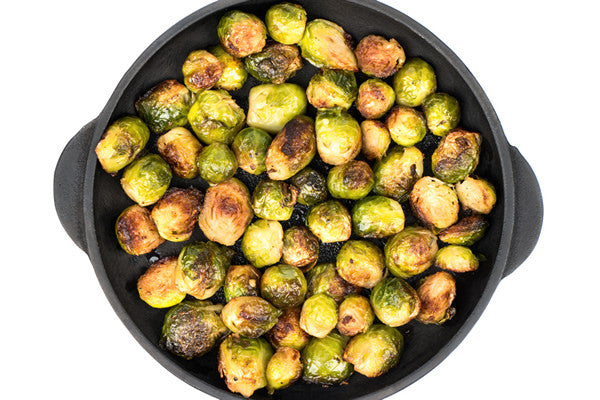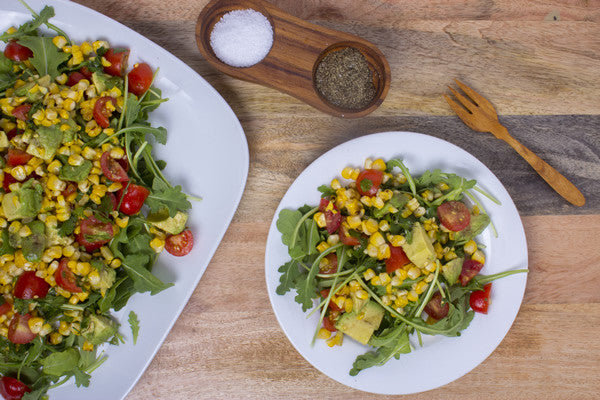


Sugar has long since developed a reputation for negatively influencing health, but you may not know the impact it has specifically on your skin. If you have ever spotted an increase in breakouts, wrinkles, or sagging in your skin, sugar could be the problem – hence the term “sugar face”. Learn what happens to skin when you eat sugar. Then, find out some healthy food alternatives that counteract these effects.
Sugar's effect on skin starts with how it's processed in the body. When you consume foods that are high in sugar, they are broken down into glucose, a form of energy for your cells. Glucose needs insulin to successfully enter the cells. Therefore, in response to excess glucose insulin levels also increase in the bloodstream. Carbohydrates that are high on the glycemic index, like candy or white bread, cause rapid spikes in insulin. When insulin levels spike rapidly, inflammation occurs.
We already know that inflammation is bad for health, in general. In terms of skin, it increases your chances of having a breakout, results in greater oil production, and ages skin prematurely. What many don't know is that inflamed skin generates special enzymes. These enzymes called advanced glycosylation end products (AGEs) break down the collagen and elastin in your skin. This process is known as glycation.
Collagen and elastin are both important proteins that help skin maintain its supple and elastic appearance. When these vital proteins are broken down, skin starts to look aged. In fact, experts are starting to refer to this phenomenon as "sugar face."
The biggest culprits of glycation are high-glycemic carbohydrates, such as bread, pasta, white rice, and potatoes--that is, those that cause rapid blood sugar spikes. Therefore, remove the obvious offenders like candy or cake. If you're trying to preserve your skin's youthful look and prevent “sugar face”, it's best to exclude fast foods, junk foods, and processed foods from your diet. Instead turn to whole food, plant-based options for healthy, skin-friendly snacking.
Although you'll want to closely watch your high-glycemic carbohydrate intake to fight glycation, healthy fats are a welcome addition to your diet. Avocados are a rich source of skin-healthy vitamins such as C, E, and K that work to replenish the body's collagen stores. Olive oil is another healthy fat that offers antioxidant protection by restoring skin's smoothness and reducing damage from ultraviolet rays.
Berries such as raspberries and blueberries are an excellent choice to include in your diet. Berries are a terrific source of antioxidants that fight inflammation in the body. Kiwi is an abundant source of Vitamin C, which is essential in collagen formation. Berries and kiwifruits are relatively low on the glycemic index.
Leafy green vegetables should be at the foundation of your plant-based diet. These veggies offer vitamin A, which is necessary for the production of retinol, a powerful anti-aging compound. Most leafy greens also contain iron, a vital nutrient for a healthy epidermis. Try spinach, kale, arugula, and collard greens to add leafy greens to your diet.
If you would like to snack your way to more youthful looking skin, nuts and seeds are a terrific plant-based option. A great source of Vitamins A, B, C, and E as well as copper and zinc, these foods can support your body's collagen production. Opt for raw versions of almond, chia seeds, pumpkin seeds, and walnuts.
In addition to making dietary changes, you can also implement a few lifestyle strategies that will increase your chances of kicking the sugar habit and improving your overall health.
Spikes in insulin are most dramatic when you wait a long time in between meals. Keep your blood sugar steady by avoiding skipping meals and by eating balanced meals of nutrient-rich foods.
You are more empowered to make healthy choices when you know what's in the foods you eat. Many processed foods in grocery stores like sauces, condiments, and salad dressing have hidden sugars. Check your ingredients list and avoid those with added sugars. Other names for sugar include high fructose corn syrup, molasses, cane sugar, barley malt, maltodextrin, dextrose, sucrose, and agave nectar.
Stress has been associated with increased inflammation and worsened skin conditions like acne and rosacea. Keep stress at bay by creating a self-care regimen. Engage in relaxation exercises such as meditation or yoga in addition to pleasurable activities like reading or gardening to relieve stress.
If you're chronically sleep deprived, your self-control is likely to be impaired. That's why you are more likely to reach for a sugary snack as a pick-me-up. However, a sweet snack only makes the problem worse because your energy levels will eventually crash after eating the sugar. Reduce your sugar cravings by practicing good sleep habits. Aim for 7 to 9 hours each night.
 RECIPES: VEGAN OTHERS
RECIPES: VEGAN OTHERS
 LIFESTYLE
LIFESTYLE
 RECIPES: VEGAN SALADS
RECIPES: VEGAN SALADS
Sign up today to receive weekly Beauty, Nutrition and Lifestyle tips, exclusive offers, and 10% off your first purchase.
Our beauty and wellness brand offers support, services and products to help you become WELL WITHIN your skin, mind and body.
Sign up today and receive your special Friends and Family 20% off your first purchase, valid until May 31, 2017.
Stay Ever Well,
Lynne + Renee
Co-founders
Thank you for signing up today to receive weekly Beauty, Nutrition and Lifestyle tips, exclusive offers and your special Friends and Family 20% off your first purchase, valid until May 31, 2017.
Stay Ever Well,
Lynne + Renee
Sign up today to receive weekly Beauty, Nutrition and Lifestyle tips, exclusive offers, and 10% off your first purchase.
Leave a comment
Comments will be reviewed prior to posting.